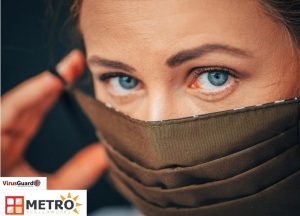 ENGLEWOOD, Colo. — May 22, 2020 — Metro Screenworks is excited to announce the inclusion of VirusGuard, a virus-filtering material, to its product offerings. VirusGuard can be utilized in several applications including creating masks, filters for masks, and constructing partitions and recently passed NH1 testing. The Denver-based screen company offers VirusGuard in bulk rolls and ships internationally.
ENGLEWOOD, Colo. — May 22, 2020 — Metro Screenworks is excited to announce the inclusion of VirusGuard, a virus-filtering material, to its product offerings. VirusGuard can be utilized in several applications including creating masks, filters for masks, and constructing partitions and recently passed NH1 testing. The Denver-based screen company offers VirusGuard in bulk rolls and ships internationally.
VirusGuard utilizes NanoScreen™ nanotechnology to restrict airborne, virus-carrying droplets, and is manufactured primarily to be made into masks and filters for masks. VirusGuard may help to increase the safety of personal masks as other safety materials may become scarce.
VirusGuard offers multi-faceted functionality and comes in two types: Type 9001 and 9002. Type 9001 has three layers and can be cut, sewn, and inserted into pre-made face masks. Type 9002 consists of five layers and is ready to be cut and sewn into personal protective equipment (PPE) masks. Both types can be hand-washed without degrading their functionality, though machine washing isn’t suggested. A Virus Guard mask can be worn 30 to 40 days with proper care. VirusGuard comes in white and black, though black requires extra manufacturing time.
VirusGuard is manufactured to be used for disposable and reusable safety masks. However, it lacks the resistance required for other applications like creating quarantine partitions. Allergy Guard, a related product, has the same potential virus-blocking capabilities as VirusGuard, but can be utilized for other applications, like constructing safety barriers and window screens, as well as creating filters.
Allergy Guard barriers are see-through and talk-through for effective team functionality in the field and are incredibly strong. Allergy Guard has a high puncture resistance of 487 Newtons, making it four-times stronger than conventional stainless steel window screen, which only has a puncture resistance of 114. Allergy Guard’s strength, however, doesn’t cause it to be cumbersome to manipulate. It can be cut to create custom barriers and used with materials such as heavy-duty duct tape, Gorilla tape, and other common means of attachment found in the field.
Allergy Guard was first retailed as a solution to allergies, allowing homeowners to open their windows, even during the height of allergy season, and enjoy fresh air without suffering from the effects of allergens. However, it isn’t just insects and allergies that this material can keep out of your home. This screening material and VirusGuard can filter out pollution, bacteria, fly ash, dust, and other harmful substances.
Both VirusGuard and Allergy Guard can filter particles as small as 0.02 microns due to their use of nanotechnology, making the coronavirus, measuring 0.1-0.3 microns, easy work for these filters. Allergy Guard’s porosity of 80% allows for excellent circulation; the Centers for Disease Control and Prevention mentions that fresh air is vital for fighting the spread of coronavirus and for maintaining one’s health. What’s more, Allergy Guard is also extremely durable, provides UV and heat protection, corrosion resistance, moisture and rain protection, and is easy-to-clean. Allergy Guard can be purchased in pre-assembled window screens or bulk rolls.
The effectiveness of VirusGuard and Allergy Guard have been both lab-tested to meet or exceed ASHRAE 52.1 test standards.
Posted May 22, 2020
Source: Metro Screenworks




